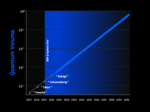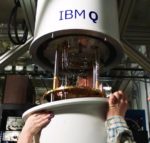All qubits are not created equal. Over at the IBM Blog, Jerry Chow and Jay Gambetta write that the company’s new Raleigh 28-qubit quantum computer has achieved the company’s goal of doubling its Quantum Volume. The development marks a shift from experimentation towards building Quantum Computers with a systems approach.
Delta Partners with IBM to Explore Quantum Computing
Today IBM and Delta Air Lines announced a multi-year collaborative effort to explore the potential capabilities of quantum computing to transform experiences for customers and employees. “Delta joins more than 100 clients already experimenting with commercial quantum computing solutions alongside classical computers from IBM to tackle problems like risk analytics and options pricing, advanced battery materials and structures, manufacturing optimization, chemical research, logistics and more.”
Video: Benchmarking Performance with Quantum Volume
“At the 2019 American Physical Society March Meeting, IBM unveiled a new scientific milestone, announcing its highest quantum volume to date. Quantum Volume is a measurement, a procedure developed by IBM, that determines how powerful a quantum computer is, accounting for both gate and measurement errors, device cross talk, as well as device connectivity and circuit compiler efficiency. It follows that the higher the Quantum Volume, the more real-world, complex problems quantum computers can potentially solve, such as simulating chemistry, modeling financial risk, and supply chain optimization.”
Video: The State of Quantum Computing in 2019
In this video from the IBM Think conference, Anthony J. Annunziata leads a panel discussion on the State of Quantum Computing in 2019. “Since launching the world’s first quantum cloud service in 2016, IBM has been at the forefront of advancing the quantum industry and making this exciting technology accessible to organizations worldwide. Get a firsthand update from two of IBM’s quantum executives on how this area is rapidly moving forward and what’s next on the horizon.”
Quantum Computing: Its Principles, Capabilities and Challenges
Dr. Mark Mattingley-Scott from IBM gave this talk at the Swiss HPC Conference. “Quantum Computing is here, right now – and we are at the start of a new way of computing, which will impact us the way the revolution started by Shockley, Bardeen and Brattain did in 1947. In this talk I will introduce Quantum Computing, its principles, capabilities and challenges and provide you with the insight you need to decide how you should engage with this revolutionary technology.”
IBM brings in Startups to Accelerate Quantum Computing
Over at the IBM blog, Jeff Welser writes that nearly 100 startups, venture capitalists, and industry thought leaders are gathering today at the first IBM Q Summit Silicon Valley event. “IBM Q Summit attendees are gathering to discuss what to expect over the next five years and what it means to be “quantum ready.” The discussion will inevitably also center on the emerging role of the quantum developer and what that means for future application development.”
Video: IBM Quantum Computing will be “Mainstream in Five Years”
Talia Gershon from the Thomas J. Watson Research Center gave this talk at the 2018 IBM Think conference. “There is a whole class of problems that are too difficult for even the largest and most powerful computers that exist today to solve. These exponential challenges include everything from simulating the complex interactions of atoms and molecules to optimizing supply chains. But quantum computers could enable us to solve these problems, unleashing untold opportunities for business.”
SXSW Podcast: Quantum Computing – Science Fiction to Science Fact
In this podcast from from SXSW 2018, Antia Lamas-Linares from TACC moderates a panel discussion on quantum computing. “Imagine a new kind of computer that can quickly solve problems that would stump even the world’s most powerful supercomputers. Quantum computers are fundamentally different. They can store information as not only just ones and zeros, but in all the shades of gray in-between. Several companies and government agencies are investing billions of dollars in the field of quantum information. But what will quantum computers be used for?”
Podcast: The Age of Quantum Computing is (Almost) Here
In this WSJ Podcast, scientists from the IBM’s T J Watson Research Center describe how quantum computing will enable a new age of scientific discovery. “Quantum computers are incredibly powerful machines that take a new approach to processing information. Built on the principles of quantum mechanics, they exploit complex and fascinating laws of nature that are always there, but usually remain hidden from view. By harnessing such natural behavior, quantum computing can run new types of algorithms to process information more holistically.”
Radio Free HPC Says Goodbye to Net Neutrality
In this podcast, the Radio Free HPC team looks at the FCC’s move to abolish Net Neutrality regulations put in place during the Obama administration. Dan thinks this is a good move to remove unnecessary regulations, but rest of the crew is worried about where this will lead the future of the Internet.













